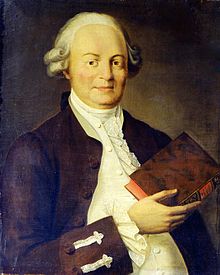music.wikisort.org - Poet
Vasily Kirillovich Trediakovsky (Russian: Васи́лий Кири́ллович Тредиако́вский; 5 March [O.S. 22 February] 1703 in Astrakhan – 17 August [O.S. 6 August] 1769 in Saint Petersburg) was a Russian poet, essayist and playwright who helped lay the foundations of classical Russian literature.[1]

Trediakovsky was a Russian literary theoretician and poet whose writings contributed to the classical foundations of Russian literature. The son of a poor priest, Trediakovsky became the first Russian commoner to receive a humanistic education abroad, at the Sorbonne in Paris (1727–30) where he studied philosophy, linguistics and mathematics.[1] Soon after his return to Russia he became acting secretary of the Academy of Sciences and de facto court poet.
In 1735 Trediakovsky published Новый и краткий способ к сложенью российских стихов ("A new and brief way for composing of Russian verses"), a highly theoretical work for which he is best remembered.[1] It discussed for the first time in Russian literature such poetic genres as the sonnet, the rondeau, the madrigal, and the ode. In 1748 appeared his Разговор об орфографии ("A Conversation on Orthography"), the first study of the phonetic structure of the Russian language. He continued his advocacy of poetic reform in О древней, средней и новой российской поезии (1752; "On Ancient, Middle, and New Russian Poetry").
Trediakovsky was also a prolific translator of classical authors, medieval philosophers, and French literature. His translations frequently aroused the ire of the censors, and he fell into disfavour with his Academy superiors and conservative court circles. In 1759 he was dismissed from the Academy. His last major work was a translation of François Fénelon's Les aventures de Telemaque (1766; Tilemakhida), which he rendered in Russian hexameters. His works marked the transition from syllabic versification to metric verse, more suited to the sound of the Russian tongue.
In 1740, Trediakovsky received a physical beating at the hand of the imperial minister Artemy Volynsky. Volynsky was arrested on charges of conspiracy and misconduct, but Trediakovsky became, "a subject of constant mockery", according to Elif Batuman: "His very propensity for receiving physical abuse became a popular comic premise."[2]
See also
- Mikhail Lomonosov, who created the basis of the modern Russian literary language
References
- Berlin, Isaiah (2008). Russian Thinkers. Penguin Classics. pp. 379–380. ISBN 978-0-14-144220-4.
- Batuman, Elif (2010). The Possessed: Adventures with Russian Books and the People who Read Them. p. 209.
На других языках
- [en] Vasily Trediakovsky
[es] Vasili Trediakovski
Vasíli Kirílovich Trediakóvski (Astracán, 5 de marzo de 1703 – San Petersburgo, 6 de agosto de 1769) fue un notable poeta, traductor, lexicógrafo, fabulista y científico ruso.[ru] Тредиаковский, Василий Кириллович
Васи́лий Кири́ллович Тредиако́вский (также Тредьяковский; 22 февраля (5 марта) 1703, Астрахань — 6 (17) августа 1768, Санкт-Петербург) — русский поэт, переводчик и филолог XVIII века, один из основателей силлабо-тонического стихосложения в России. Впервые ввёл гекзаметр в арсенал русских стихотворных размеров. Впервые в русском языке и литературе теоретически разделил поэзию и прозу и ввёл эти понятия в русскую культуру и общественное сознание[9]. Его интересы в области метрики стиха также сопрягались с композиторской деятельностью, главным образом, это была кантовая музыка. По чинам — надворный советник (1765).Другой контент может иметь иную лицензию. Перед использованием материалов сайта WikiSort.org внимательно изучите правила лицензирования конкретных элементов наполнения сайта.
WikiSort.org - проект по пересортировке и дополнению контента Википедии